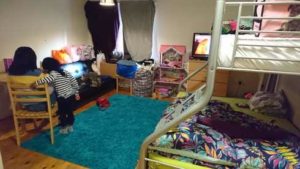There are homeless people living in the Morrisons carpark in Blackburn. Their camp is on the second floor of the parking lot. There are no tents in the camp: just duvets on the wet ground, clothes in bags and trolleys, and sleeping bags spread out on the duvets.
I wouldn’t choose it – but there are guys drinking near the camp who say that people do choose it. Ed, 30, says that. Ed says the people who live in the camp could choose a hostel or shelter – “there are services in the town that can put a roof over the head for one night” – but they don’t. That’s because hostels mean strict rules and restrictions. In the camp, people can do as they like. Doing as they like often means getting blasted on spice – as Ed speaks, two camp residents suddenly stand up and leave, saying “we’ve got to sort something out” as they go – but that’s their choice and people set store by their right to make it.
Steve, 55, lives at the camp (I talked to Steve earlier). He says he’s been at the camp on and off for a year. “Gets violent sometimes, but that’s all part of the territory, isn’t it?” Steve says that he was recently diagnosed with Alzeheimer’s. His time at the camp might end soon because of that. “I think sooner or later, they will want us to go into sheltered accommodation…can’t drink in there… I like a smoke.”
“People do what they want to do…you know what I mean?” Ed says. I do. I’ve seen it a lot in austerity: people at the end of various ropes who decide that freedom beats lockdown. People in this part of the picture have been making that choice for years.
Ed has himself chosen a hostel and its rules this time around. Ed and his girlfriend Pat, 23, and another friend, Rob, who is in his 20s, live at the Salvation Army hostel in the middle of Blackburn. Another friend, Mark, has his own flat. All 4 come to the Morrisons carpark regularly to drink. “I’m an alcoholic,” Ed says. Rob says that he’s an alcoholic, too.
There are rules at the hostel – no drinking, no drugs and no sex, by the sounds of things. “We’re not allowed in each other’s rooms, or anything like that,” Pat says. “If I got caught in his (Ed’s) room, we’d be in trouble.”
“Even if I go near her,” Ed says. He laughs. He says the hostel is “like a 55-bedroom holiday camp… basically, it’s like when you see prison – like you get wings [different wings in a building]. It’s camera-d up everywhere – staff room, staff walkabout places…[you have] a single room there, lock on the door. [You’re] very safe there…toilets shared and you’ve got a main canteen…” Ed says that the hostel isn’t bad. “It’s all right… they give you meals every day and all that…I’ve been in there [in the hostel] like 3 times. It’s because of mad shit I’ve done in my life…”
For Ed, the mad shit involved working like the clappers in pubs and bars, and drinking himself to oblivion. Bubble [mephedrone] was Ed’s other poison: “…when you take a line of that stuff – ah…” The plan now – it’s the plan for everyone in the hostel, rather than Ed’s plan personally – is to achieve sobriety and and independence. “You leave there [the hostel] – you’re meant to go into your own place… independent living.”
“Can you do that?” I ask Ed. “Can you afford it?”
“No,” Ed says cheerfully.
Ed has parked the idea of sobriety for the time being. Ed, Pat, Rob and Mark take me to the Sally Army hostel via an off-licence where they buy more cans. At the hostel, they point out the security cameras. We talk in the hostel entrance until a staff member comes out and asks people to take the beers elsewhere. People head to the cathedral grounds. It’s raining, but nobody cares. They’re free to do as they like.
———————————————
Transcript of Blackburn interviews, January 2020 (names changed on request):
At the Morrisons carpark camp on the second floor, there are two guys sitting on wet bedding. They are very out of it. They’re looking at a phone. They stand up and leave suddenly: “we’ve got to sort something out.”
Ed, Pat, Rob and Mark are drinking next to the bedding. Rob comes up to me. “Do you want a Haribo?” he says. He has a packet.
Me: Are you living up here as well?
Rob: Nah. I don’t live here.
Ed: Are you a journalist? So how come you’re coming up here?
Me: Because I heard that you guys were living up here [in the Morrisons carpark]… and I write about housing and benefits.
Rob: Some people live on here.
Ed: Do you know what… we went away for 5 years, yeah, and we come back to find that people are actually living here…do you know what the funny thing is, though… people do what they want to do… there are services in the town that can put a roof over the head for one night, but they do… do you know what I mean. Continue reading →

